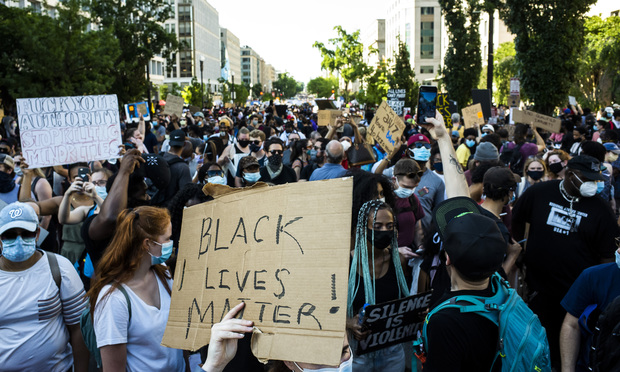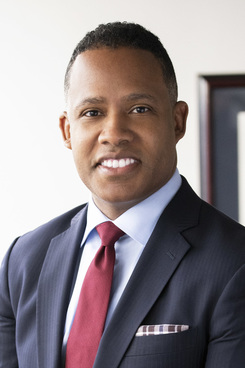'Help Do Justice': Big Law Commits to Litigation Fight Against Racist Policing
Dozens of private firms have agreed to work pro bono on the ACLU of Louisiana's "Justice Lab" project, filing up to 1,000 civil complaints alleging racist policing tactics.
July 09, 2020 at 10:00 AM
9 minute read
The original version of this story was published on The American Lawyer
 Thousands march in Washington, D.C. protesting police brutality and the killing of George Floyd in Minnesota at the hands of local police, on Saturday, June 6, 2020. Photo: Diego M. Radzinschi/ALM
Thousands march in Washington, D.C. protesting police brutality and the killing of George Floyd in Minnesota at the hands of local police, on Saturday, June 6, 2020. Photo: Diego M. Radzinschi/ALM
A new round of Big Law firms and legal clinics are committing to a new ACLU project aimed at creating a wave of civil litigation in Louisiana to fight racism in policing, positioning the program to begin filing complaints in spring 2021.
The ACLU of Louisiana last month launched the project, called "Justice Lab: Putting Racist Policing on Trial," with the goal of getting 100 private law firms and 25 law clinics to file up to 1,000 civil lawsuits alleging racist police actions. Eighteen law firms were on board within a couple of weeks, and the ACLU on Thursday announced the addition of another 16 firms and 14 law school clinics.
The participating firms feature Big Law practices with significant pro bono presence. Those announced Thursday include Dorsey & Whitney, Kirkland & Ellis, Nelson Mullins Riley & Scarborough, Sidley Austin and Sullivan & Cromwell. They join firms already involved, including Boies Schiller Flexner; Covington & Burling; King & Spalding; Orrick, Herrington & Sutcliffe; and Venable.
The project, spearheaded by Nora Ahmed, the legal director for the ACLU of Louisiana, seeks to create a civil litigation blueprint in Louisiana's courts that can then be used in other states to fight racist tactics used by law enforcement, such as challenges to the court-created doctrine of qualified immunity and asserting equal protection claims. The project comes on the heels of the mass demonstrations over the police killings of George Floyd and other Black Americans, fueling calls for police reform.
"We've seen when one has an excessive-force case, where you're talking about extraordinary brutality and death, folks react in ways where it's very clear that there was excessive force that was not necessary," Ahmed said. "But there's also a lot of racial profiling and harassment that happens to individuals on a daily basis. And it's currently very difficult in an individual case to argue that one has been subjected, effectively, to racist policing. And yet, as a nation, we recognize that that is happening every day."
Ahmed said the ACLU has gotten enough committed firms to start training attorneys and begin seeking out civil cases, often with the help of local nonprofits. Louisiana has a one-year statute of limitations for most civil actions, meaning they're now looking for cases that took place over the past three months with the goal of filing by March 2021.
She also said she plans on moving out firms in cohorts of 25, to make sure trial teams are able to be trained on the law they'll be challenging and get an in-depth education about the communities they'll be representing in court.
Part of the training will feature a lecture from Berkeley Law Dean Erwin Chemerinsky, who Ahmed said will discuss qualified immunity and equal protection doctrines with the goal of eliminating the first and amplifying the second.
"I hope that this will be a model used elsewhere around the country," Chemerinsky said in an email about the project. "I am thrilled to lend my knowledge about civil rights litigation to be part of this."
Cases that go up on appeal will generally be represented by law school legal clinics, 14 of which were announced on Thursday. The clinics include Georgetown Law's Appellate Courts Immersion Clinic, Penn State Law's Civil Rights Appellate Clinic, Tulane Law School's Civil Rights & Federal Practice Clinic, and UC Irvine School of Law's Civil Rights Litigation Clinic.
Ahmed pointed to the University of Texas Law School's Supreme Court Clinic in particular as potentially helpful in trying to see qualified immunity cases through the U.S. Court of Appeals for the Fifth Circuit to the U.S. Supreme Court, where the justices recently declined to hear several cases that could have overturned the doctrine.
Jahmy Graham, a partner with Nelson Mullins, said he joined the firm four months ago with the goal of continuing to do the kind of pro bono work he had done at his last firm, Morgan, Lewis & Bockius. He said the mass outrage and movement stemming from Floyd's killing reaffirmed that motivation.
"I'm excited to get started, and to help do justice and give victims the support that they need and the legal remedies they need," Graham said. "But at the same time, recognize that we need good law enforcement and we need law enforcement that's accountable. But we also need law enforcement that's supported by the community because, ultimately, we have to get through this together."
"We shouldn't be alienating ourselves and being so partisan on an issue that shouldn't be political at all, it's a matter of human rights and common civility. This is a time we can actually harness some of that energy for positive change, and not be so polarized on an issue like this," he added.
 Kenneth Polite, a partner with Morgan, Lewis & Bockius and the former U.S. attorney for the Eastern District of Louisiana/courtesy photo
Kenneth Polite, a partner with Morgan, Lewis & Bockius and the former U.S. attorney for the Eastern District of Louisiana/courtesy photoKenneth Polite is a partner with Morgan Lewis, which was in the first wave of firms to join the project. Before going into private practice he served as the U.S. attorney for the Eastern District of Louisiana, and said once he heard of the project, he immediately pushed for his firm to get involved.
He said several members of his family, including his brother and father, are or have been in law enforcement, and that he was involved with a consent decree between the Justice Department and the New Orleans Police Department to reform that department over its own history of misconduct.
"What we're seeing is these overlapping aspects of our criminal justice system—police engaging in misconduct, overwhelming violence, incarceration that doesn't seem to be curing either," Polite said.
The former federal prosecutor said he's hopeful the project can create "a tremendous source of best practices that can be replicated in other parts of the country, of us using litigation to hopefully ease law enforcement agencies into implementing some of these reforms."
"This isn't the only tool. There should be efforts for us to engage with law enforcement agencies in a cooperative fashion as well, which frankly will be much, much less expensive and in the long run, hopefully be more widely accepted, more easily accepted in some cases, by law enforcement partners," Polite continued. "We've got to utilize a number of different tools here and this litigation role is one of those."
'We're All a Part of the Solution'
Among the program's requirements for law firms is diversity on the legal teams working on the cases. Firms are asked to make their teams 50% women, 50% people of color and 30% members of the LGBTQ+ community.
Ahmed, who was previously an associate with Paul, Weiss, Rifkind, Wharton & Garrison, said that's a deliberate effort to make sure those associates can gain experiences from the pro bono impact litigation they might not otherwise get to work on until later in their careers, and can later assist them in paid work.
While Big Law firms are more diverse now than they have been in the past, the program has amplified that not all are as representative as they could be. Ahmed said some firms have told her they don't have the staffing to meet those goals.
"This is definitely not an attempt to force people of color to be the only ones dealing with these issues, it's really meant to try to get at other issues that are endemic in the legal profession," Ahmed said. "We often don't see a lot of women as managing partners and just percentage-wise as close to a majority of partners at firms. And of course, this gets worse for people of color and women of color."
Graham, of Nelson Mullins, said having diverse legal teams work on the project will also help associates and of counsel at the firms get access to opportunities they might not get to until later in their careers, like depositions and trial experience.
"I think it's important that we're all a part of the solution because that requires collective energy and collective participation. And that includes women, people of color, white people, everyone. It includes us all," Graham said. "So I love that the goal here is not just to get folks involved who may or may not look like the victim in the case, but also people who would be reflective of the communities in which these incidents happen. They're reflective of the makeup of juries and of police departments."
Polite echoed Graham and Ahmed's points, adding that the project will also give white attorneys who want to push for equality a way to do so.
"Ally is not just a noun, it's a verb. And frankly, we have to emphasize that verb and what we're looking for is action," Polite said. "This gives those individuals who may not be diverse attorneys an opportunity to actually show true action through engagement in this space. So my view is those diverse voices that are all engaged in this work will ultimately lead to much more powerful and much more successful results from this initiative."
This content has been archived. It is available through our partners, LexisNexis® and Bloomberg Law.
To view this content, please continue to their sites.
Not a Lexis Subscriber?
Subscribe Now
Not a Bloomberg Law Subscriber?
Subscribe Now
NOT FOR REPRINT
© 2025 ALM Global, LLC, All Rights Reserved. Request academic re-use from www.copyright.com. All other uses, submit a request to [email protected]. For more information visit Asset & Logo Licensing.
You Might Like
View All
Spotify GC Steps Down, Opts to 'Step Away From Full-Time Corporate Life'
2 minute read
Diversity Lab Alters DEI-Centered Verbiage on Mansfield Certification Website


NJ Jury Awards $8M to Woman Injured by Employees Chasing Suspected Shoplifter
3 minute readLaw Firms Mentioned
Trending Stories
- 1Federal Judge Pauses Trump Funding Freeze as Democratic AGs Launch Defensive Measure
- 2Class Action Litigator Tapped to Lead Shook, Hardy & Bacon's Houston Office
- 3Arizona Supreme Court Presses Pause on KPMG's Bid to Deliver Legal Services
- 4Bill Would Consolidate Antitrust Enforcement Under DOJ
- 5Cornell Tech Expands Law, Technology and Entrepreneurship Masters of Law Program to Part Time Format
Who Got The Work
J. Brugh Lower of Gibbons has entered an appearance for industrial equipment supplier Devco Corporation in a pending trademark infringement lawsuit. The suit, accusing the defendant of selling knock-off Graco products, was filed Dec. 18 in New Jersey District Court by Rivkin Radler on behalf of Graco Inc. and Graco Minnesota. The case, assigned to U.S. District Judge Zahid N. Quraishi, is 3:24-cv-11294, Graco Inc. et al v. Devco Corporation.
Who Got The Work
Rebecca Maller-Stein and Kent A. Yalowitz of Arnold & Porter Kaye Scholer have entered their appearances for Hanaco Venture Capital and its executives, Lior Prosor and David Frankel, in a pending securities lawsuit. The action, filed on Dec. 24 in New York Southern District Court by Zell, Aron & Co. on behalf of Goldeneye Advisors, accuses the defendants of negligently and fraudulently managing the plaintiff's $1 million investment. The case, assigned to U.S. District Judge Vernon S. Broderick, is 1:24-cv-09918, Goldeneye Advisors, LLC v. Hanaco Venture Capital, Ltd. et al.
Who Got The Work
Attorneys from A&O Shearman has stepped in as defense counsel for Toronto-Dominion Bank and other defendants in a pending securities class action. The suit, filed Dec. 11 in New York Southern District Court by Bleichmar Fonti & Auld, accuses the defendants of concealing the bank's 'pervasive' deficiencies in regards to its compliance with the Bank Secrecy Act and the quality of its anti-money laundering controls. The case, assigned to U.S. District Judge Arun Subramanian, is 1:24-cv-09445, Gonzalez v. The Toronto-Dominion Bank et al.
Who Got The Work
Crown Castle International, a Pennsylvania company providing shared communications infrastructure, has turned to Luke D. Wolf of Gordon Rees Scully Mansukhani to fend off a pending breach-of-contract lawsuit. The court action, filed Nov. 25 in Michigan Eastern District Court by Hooper Hathaway PC on behalf of The Town Residences LLC, accuses Crown Castle of failing to transfer approximately $30,000 in utility payments from T-Mobile in breach of a roof-top lease and assignment agreement. The case, assigned to U.S. District Judge Susan K. Declercq, is 2:24-cv-13131, The Town Residences LLC v. T-Mobile US, Inc. et al.
Who Got The Work
Wilfred P. Coronato and Daniel M. Schwartz of McCarter & English have stepped in as defense counsel to Electrolux Home Products Inc. in a pending product liability lawsuit. The court action, filed Nov. 26 in New York Eastern District Court by Poulos Lopiccolo PC and Nagel Rice LLP on behalf of David Stern, alleges that the defendant's refrigerators’ drawers and shelving repeatedly break and fall apart within months after purchase. The case, assigned to U.S. District Judge Joan M. Azrack, is 2:24-cv-08204, Stern v. Electrolux Home Products, Inc.
Featured Firms
Law Offices of Gary Martin Hays & Associates, P.C.
(470) 294-1674
Law Offices of Mark E. Salomone
(857) 444-6468
Smith & Hassler
(713) 739-1250








